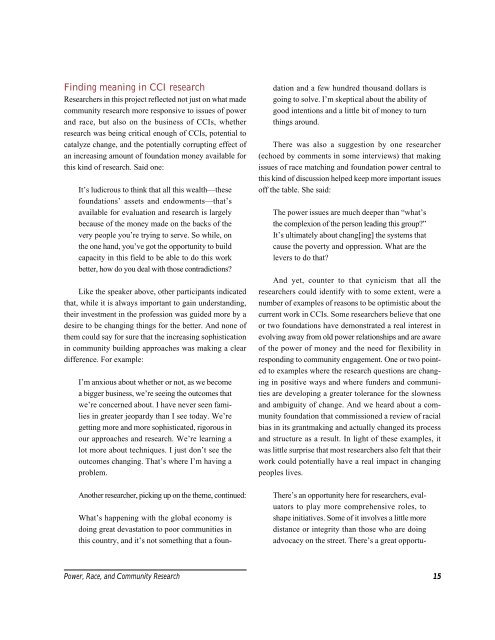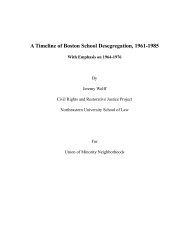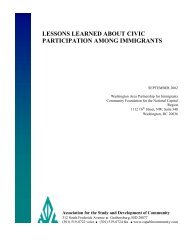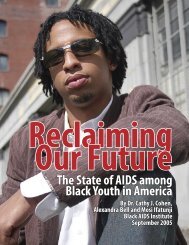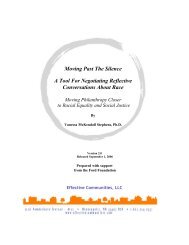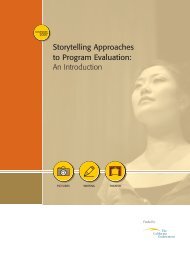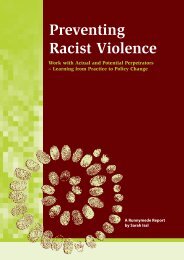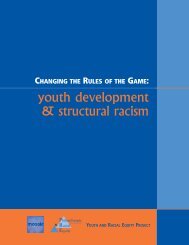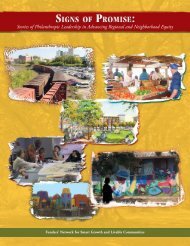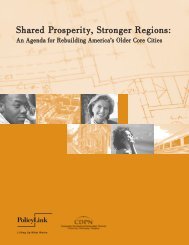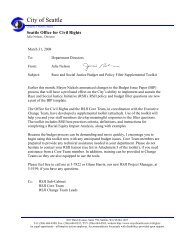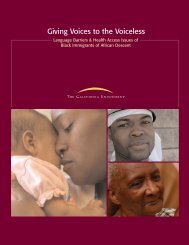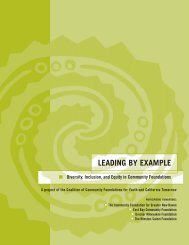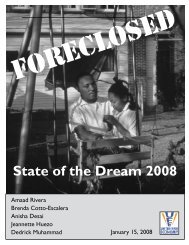Core Issues in Comprehensive Community-Building Initiatives ...
Core Issues in Comprehensive Community-Building Initiatives ...
Core Issues in Comprehensive Community-Building Initiatives ...
Create successful ePaper yourself
Turn your PDF publications into a flip-book with our unique Google optimized e-Paper software.
F<strong>in</strong>d<strong>in</strong>g mean<strong>in</strong>g <strong>in</strong> CCI research<br />
Researchers <strong>in</strong> this project reflected not just on what made<br />
community research more responsive to issues of power<br />
and race, but also on the bus<strong>in</strong>ess of CCIs, whether<br />
research was be<strong>in</strong>g critical enough of CCIs, potential to<br />
catalyze change, and the potentially corrupt<strong>in</strong>g effect of<br />
an <strong>in</strong>creas<strong>in</strong>g amount of foundation money available for<br />
this k<strong>in</strong>d of research. Said one:<br />
It’s ludicrous to th<strong>in</strong>k that all this wealth—these<br />
foundations’ assets and endowments—that’s<br />
available for evaluation and research is largely<br />
because of the money made on the backs of the<br />
very people you’re try<strong>in</strong>g to serve. So while, on<br />
the one hand, you’ve got the opportunity to build<br />
capacity <strong>in</strong> this field to be able to do this work<br />
better, how do you deal with those contradictions?<br />
Like the speaker above, other participants <strong>in</strong>dicated<br />
that, while it is always important to ga<strong>in</strong> understand<strong>in</strong>g,<br />
their <strong>in</strong>vestment <strong>in</strong> the profession was guided more by a<br />
desire to be chang<strong>in</strong>g th<strong>in</strong>gs for the better. And none of<br />
them could say for sure that the <strong>in</strong>creas<strong>in</strong>g sophistication<br />
<strong>in</strong> community build<strong>in</strong>g approaches was mak<strong>in</strong>g a clear<br />
difference. For example:<br />
I’m anxious about whether or not, as we become<br />
a bigger bus<strong>in</strong>ess, we’re see<strong>in</strong>g the outcomes that<br />
we’re concerned about. I have never seen families<br />
<strong>in</strong> greater jeopardy than I see today. We’re<br />
gett<strong>in</strong>g more and more sophisticated, rigorous <strong>in</strong><br />
our approaches and research. We’re learn<strong>in</strong>g a<br />
lot more about techniques. I just don’t see the<br />
outcomes chang<strong>in</strong>g. That’s where I’m hav<strong>in</strong>g a<br />
problem.<br />
Another researcher, pick<strong>in</strong>g up on the theme, cont<strong>in</strong>ued:<br />
What’s happen<strong>in</strong>g with the global economy is<br />
do<strong>in</strong>g great devastation to poor communities <strong>in</strong><br />
this country, and it’s not someth<strong>in</strong>g that a foundation<br />
and a few hundred thousand dollars is<br />
go<strong>in</strong>g to solve. I’m skeptical about the ability of<br />
good <strong>in</strong>tentions and a little bit of money to turn<br />
th<strong>in</strong>gs around.<br />
There was also a suggestion by one researcher<br />
(echoed by comments <strong>in</strong> some <strong>in</strong>terviews) that mak<strong>in</strong>g<br />
issues of race match<strong>in</strong>g and foundation power central to<br />
this k<strong>in</strong>d of discussion helped keep more important issues<br />
off the table. She said:<br />
The power issues are much deeper than “what’s<br />
the complexion of the person lead<strong>in</strong>g this group?”<br />
It’s ultimately about chang[<strong>in</strong>g] the systems that<br />
cause the poverty and oppression. What are the<br />
levers to do that?<br />
And yet, counter to that cynicism that all the<br />
researchers could identify with to some extent, were a<br />
number of examples of reasons to be optimistic about the<br />
current work <strong>in</strong> CCIs. Some researchers believe that one<br />
or two foundations have demonstrated a real <strong>in</strong>terest <strong>in</strong><br />
evolv<strong>in</strong>g away from old power relationships and are aware<br />
of the power of money and the need for flexibility <strong>in</strong><br />
respond<strong>in</strong>g to community engagement. One or two po<strong>in</strong>ted<br />
to examples where the research questions are chang<strong>in</strong>g<br />
<strong>in</strong> positive ways and where funders and communities<br />
are develop<strong>in</strong>g a greater tolerance for the slowness<br />
and ambiguity of change. And we heard about a community<br />
foundation that commissioned a review of racial<br />
bias <strong>in</strong> its grantmak<strong>in</strong>g and actually changed its process<br />
and structure as a result. In light of these examples, it<br />
was little surprise that most researchers also felt that their<br />
work could potentially have a real impact <strong>in</strong> chang<strong>in</strong>g<br />
peoples lives.<br />
There’s an opportunity here for researchers, evaluators<br />
to play more comprehensive roles, to<br />
shape <strong>in</strong>itiatives. Some of it <strong>in</strong>volves a little more<br />
distance or <strong>in</strong>tegrity than those who are do<strong>in</strong>g<br />
advocacy on the street. There’s a great opportu-<br />
Power, Race, and <strong>Community</strong> Research 15


